You have no items in your cart. Want to get some nice things?
Go shopping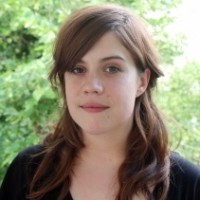 Tempted by The Reader Berlin‘s intensive writing workshops this summer? Berlin resident and literary advisor Nerys Hudson shares the city’s literary highlights, from walking tours and literature houses to festivals, bookshops and cafes.
Tempted by The Reader Berlin‘s intensive writing workshops this summer? Berlin resident and literary advisor Nerys Hudson shares the city’s literary highlights, from walking tours and literature houses to festivals, bookshops and cafes.
Berlin occupies an odd space in the history of literary cities: less prestigious than London, less romantic than Paris, less visceral than Dublin, less frenetic than New York. Yet despite a decidedly underdog reputation, Berlin endures amongst writers, even if only for a brief moment in time.
Because it is the idea of a moment in time that makes Berlin special in literary terms. Berlin is a backdrop on which to paint a historical picture, observed as the world keeps spinning around you, but it will also force you to stop and look again. For this reason, Berlin is the ultimate of literary cities. It is a story that conspicuously evolves, and a story waiting to be explored. But where to begin?
Find the locations mentioned below on our map. Or view A Guide to Literary Berlin in a larger map.
Sightseeing Highlights
The Isherwood Walking Tour
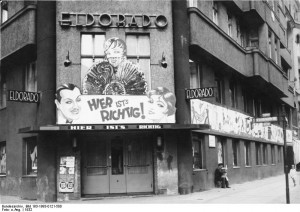 Expat writers steadily flocked to Berlin in the early 20th century – from Robert Walser to Franz Kafka and Vladimir Nabakov. But for most English speakers, Berlin’s most famous adopted son is Christopher Isherwood. Observing the sordid, splendid absurdities of the final days of decadence in Berlin, Isherwood’s diaries and Berlin novels are still a fine guide to the city, and the subject of Brendan Nash’s expertly led Isherwood Walking Tour. A circular one-hour walk around the Nollendorfplatz area, it’s a great introduction to the writer and the city he was so intertwined with. Click here for more information on the tour and booking.
Expat writers steadily flocked to Berlin in the early 20th century – from Robert Walser to Franz Kafka and Vladimir Nabakov. But for most English speakers, Berlin’s most famous adopted son is Christopher Isherwood. Observing the sordid, splendid absurdities of the final days of decadence in Berlin, Isherwood’s diaries and Berlin novels are still a fine guide to the city, and the subject of Brendan Nash’s expertly led Isherwood Walking Tour. A circular one-hour walk around the Nollendorfplatz area, it’s a great introduction to the writer and the city he was so intertwined with. Click here for more information on the tour and booking.
Bebelplatz
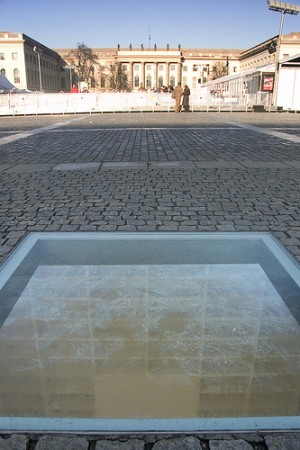
Works by Alfred Döblin, Sigmund Freud and Ernest Hemmingway were among over 25,000 books committed to the flames at Bebelplatz, on the night the German Student Association of Nazi Germany ransacked libraries and burned literature deemed “un-german”. Peer down Micha Ullman’s glass plate in the middle of the square’s cobbles, and you’ll see only empty bookshelves. Nearby, engraved on a separate plaque is a line from Heinrich Heine’s play Almansor – “Dort, wo man Bücher verbrennt, verbrennt man am Ende auch Menschen”: “Where they burn books, they will in the end also burn people.” Bebelplatz, 10117 Berlin
Dorotheenstädtischen Friedhof
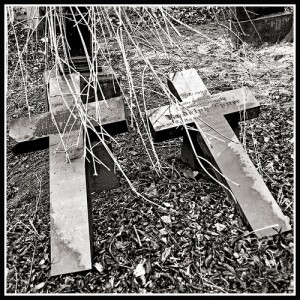
Cemeteries are not top of everyone’s sightseeing list, and it may not be as sprawling or epic as the Père Lachaise cemetery in Paris, but the Doroteenstädtischen Friedhof is the resting place for some of Berlin’s greatest minds. Georg Wilhelm Friedrich Hegel, Heiner Muller, Heinrich Mann, Herbert Marcuse, Christa Wolf and Bertolt Brecht (whose old residence over looks the Dorotheenstädtischen Friedhof) are among the many residents of the cemetery, located in the Mitte district. Dorotheenstädtischen Friedhof, Chausseestraße 126-127, 10115 Berlin. Open: 8am until sunset
The Grimm Zentrum Library
Although intended for use by the students at Humboldt University, the Grimm Zentrum library is open to the public, although you will have to check your bag in first. The library is –no surprises – named after the famous Grimm Brothers, who spent their final years in Berlin, labouring over a project that would go on to become Germany’s first official dictionary many years later.
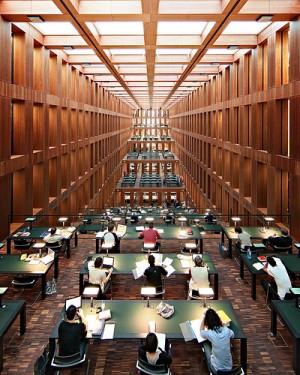
At first glance, the Grimm Zentrum does look like some sort of knowledgeable prison thanks to a very angular and thoroughly modern façade. But whilst it may not evoke Prussian opulence, the library is not without it’s own charms. Once inside you’ll find around 2 million books bolstering the edges of the building. In the middle of the library is what looks like a futuristic nerve centre, a tiered, multi-platform reading area. The Grimm Zentrum collection pales in significance when compared to the Staatsbibliothek’s 11 million strong titles – but you would definitely trade all those books to get a table in the centre here (and if you want that table, make sure you go early). Jacob und Wilhelm Grimm Zentrum, Geschwister-Scholl-Strasse, 10117 Berlin. Opening hours: Mon-Fri 8am-12am. Sat-Sun: 10am-6pm
Literary Events
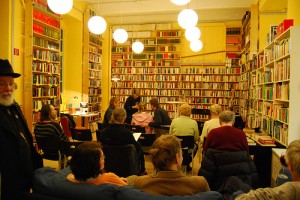
German language events can be found in the many literature houses dotted about the city, appealing to audiences on a distinctly non-commercial level. Often run as a not-for-profit, they focus is less on selling books and more on hosting readings and discussion forums. Berlin now has five literature houses, including LiteraturWERKstatt, the suitably imposing Literatisches Colloquium Berlin, Brecht Haus, Lettretage and The Literaturhaus, which is famed for its café as much as its cultural programme. Note – German readings are known for their length – events at bookshops like Dussmann’s colossal Kulturkaufhaus on Friedrichstrasse are resplendent with marathon 45-minute author readings.
Then there are the festivals. Internationales Literaturfestival Berlin offers up plenty of big names across the world for numerous panel discussions and readings. Mainly based in the auditoriums of the Haus der Berliner Festspiele, it’s hard to find a suitable competitor for the ILB programme. Past authors include Tahar Ben Jelloun, David Mitchell, Isabel Allende and DBC Pierre. Poetry fans have a similar, sprawling event in the PoesieFestival, held mainly at the Academy of the Arts and offering 10 days of some 200 poets. English language events are at both festivals.
For other English language events, alongside the likely suspect of the British Council, the American Academy in Berlin run a programme of events, incorporating their resident fellows. Past alumni of the annual programme include Jonathan Safran Foer, Karen Russell, Katherine Boo and Jeffrey Eugenides.
Bookshops & Journals
Inevitably though, the main champions of literary events in English are the bookshops and local journals. Notable mentions go to SAND Journal and No Mans Land who have been known to throw legendary launches and some thought provoking discussions, cementing their reputation as true supporters of fine writing and translation.
The journals work closely with Berlin’s numerous English-language bookshops, where there is plenty of shelf fodder alongside the readings. Dialogue Books recently closed it’s physical bookshop doors, but there is still an online bookshop, a diverse range of events in the plush surroundings of Soho House and their new office at The Wye, with Tom McCarthy, A.M. Homes, Ned Beauman and Clare Messud all previous guests in their regular Literary Lounge.
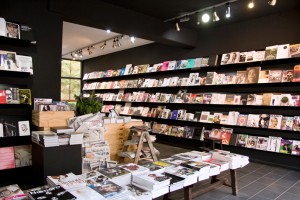
Relative newcomer Shakespeare and Sons has all the hallmarks of your new favourite bookshop. A café with homemade bagels; a beautiful stock selection with second hand and new books on the shelves and an open attitude to programming that encompasses books, music and more. No surprise then that the Prenzlauer Berg outpost of the original Prague bookshop has quickly endeared itself to the city.
Another Prenzlauer Berg resident is Saint George’s English Bookshop. A Berlin bookshop stalwart, Saint George’ s boasts an eclectic line-up of events and a huge range of second hand books, alongside an enviable selection of works from smaller, independent presses. Expect Melville House, Dalkey Archive and tons of other treasures. Their collection of English translations of German authors is also one of the best in the city.
Over in Kreuzberg, Another Country has been a mainstay of literary nomads for some seven years, with the often eccentric and chaotic stock reflecting the deeply passionate tastes of owner Sophia Raphaeline. Books are generally for loan rather than sale, tying into Another Country’s community ethos. If you come later on Fridays and make it downstairs to their cellar, Sophie will nourish you with home-cooked food in an informal group of book lovers and writers, all for a very reasonable price.
Other shops worth a visit include the legendary Marga Schoeller bookshop, a venerable 80-year old institution with a very decent English language section and Ocelot, Not Just Another Bookstore, which lives up to it’s name thanks to it’s enlightened booksellers and beautiful café. Magazine lovers will find their heart’s desire at Do You Read Me?!, and their side project The Reading Room is the place to go for most international magazine launches. Finally, for politics, art and design, Motto, Pro-Qm and Gestalten Space offer three very different but equally brilliant takes on publications that you couldn’t leave confined to the coffee table.
Writer Resources
Established and aspiring writers regularly flow in and out of the city, enabled by grants and stipends or emboldened by numerous proclamations of cheap rents (a promise that considerably blurs the boundaries between fact and fiction).
As a result, workshops and creative writing courses are in abundance in the city, even amongst English speakers. If you are staying longer, online forums and the excellent Literary List email will alert you to the main courses (sign up by emailing Fiona at fiona_mclellan [at] yahoo [dot] com).
Author services can be found via The Reader Berlin, with editing, mentoring and much more all covered. Weekly evening creative writing classes are always booked up and deservedly so, with tutors covering poetry, screenwriting, non-fiction and fiction. And if you are looking for an excuse to escape to Berlin, their summertime intensive workshops will do the trick.
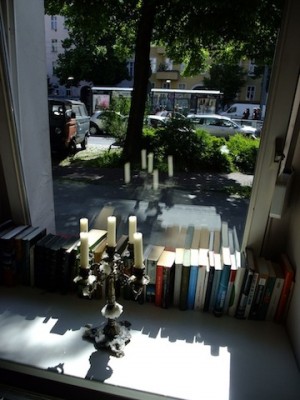
You’ll also want to find yourself a cafe to work from or read at, and with the legendary Romanisches Café (a sort of Berlin equivalent of Café de Flore) now reincarnated at the newly opened Waldorf Astoria, you may have to settle for less salubrious surroundings. St Gaudy Café and Café Hilde will do the job very well, and boast strong literary links alongside the perquisite caffeine supplies.
And if you are staying a while, be sure to check up on the blogs – from the mighty triumverate of Readux, Transfiction and Love German Books for recommendations and news through to Slow Travel Berlin, Sugarhigh and Berlin Stories for NPR for a complementary bigger cultural picture.
A Berlin Reading List
Finally, no guide to the city would be complete without a list of books about it. The following are highly recommended Berlin reading.
 Going to the Dogs by Erich Kaestner
Going to the Dogs by Erich Kaestner
If you’ve read Isherwood’s Berlin Stories, the other great fable of the fall of Weimar is Erich Kaestner’s Going to the Dogs. Just as sharply observed as Isherwood, and yet seemingly more tragic due to Kaestner’s genuine despair as the city he called home begins to collapse.
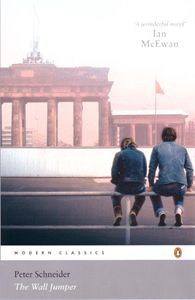 The Wall Jumper by Peter Schneider
The Wall Jumper by Peter Schneider
Definitely one of the best books ever written about the Berlin Wall, which features as a main character in a fiction that reads like history.
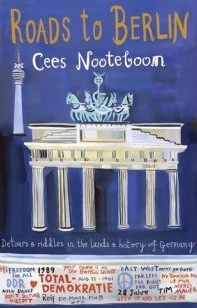 Roads to Berlin by Cees Nooteboom
Roads to Berlin by Cees Nooteboom
Featuring numerous travelogues and reports on the way to constructing unified Berlin, the journalist Cees Nooteboom offers up a deeply personal account of the problems faced after the wall came down.
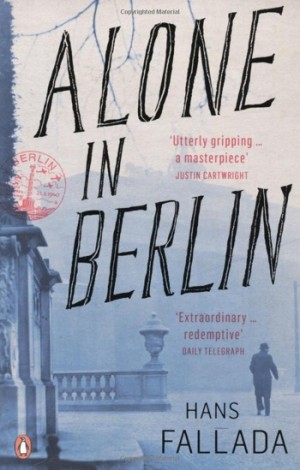 Alone in Berlin by Hans Fallada
Alone in Berlin by Hans Fallada
Hans Fallada was one of the more troubled German writers, and his life story in general makes fascinating reading. Written in just 24 days, Alone in Berlin stands out as a truly remarkable story of resistance and courage in the face of terror.
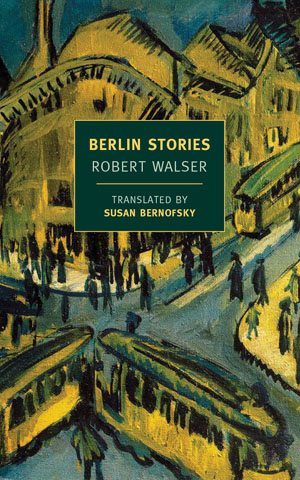 Berlin Stories by Robert Walser
Berlin Stories by Robert Walser
Turn of the century Berlin seen through Walser’s roaming, outsider eye. Arriving in Berlin in 1905, his observations on his meanderings through the city and its various inhabitants are bitingly funny, with beautiful, impressionistic descriptions of a metropolis in the making.
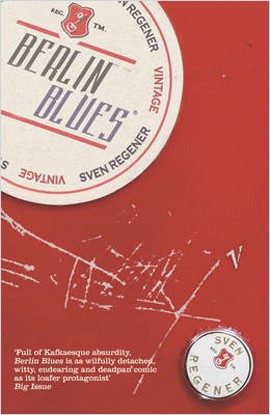 Berlin Blues by Sven Regener
Berlin Blues by Sven Regener
For Herr Lehrmann, the somewhat anti-hero of Berlin Blues, the responsibilities of life are there to be ignored, including the fall of the wall. There are some great descriptions of the Kreuzberg of West Berlin in this book, and the deadpan tone of Lehrmann is pitch perfect.
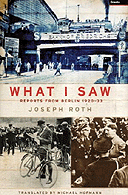 What I Saw by Joseph Roth
What I Saw by Joseph Roth
A precursor to Isherwood’s Berlin, Roth’s journalistic dispatches of the underbelly of 1920’s Berlin are both acutely observed and politically charged, anticipating the downfall of a fragile Republic.
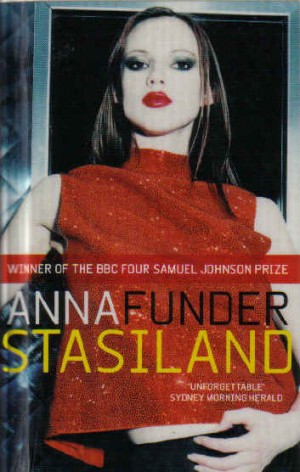 Stasiland by Anna Funder
Stasiland by Anna Funder
Another blend of investigative journalism and sometimes not so subtle narrative, Anna Funder’s Stasiland still remains as one of the definitive books on life behind the Iron Curtain.
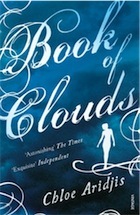 Book of Clouds by Chloe Aridjis
Book of Clouds by Chloe Aridjis
Less about Berlin geographically, Book of Clouds still manages to capture a very Berlin conflict between the eternal, and the fleeting. The unknowable, the obscure, the feeling of drifting, the creation of identity are all explored – although like the characters, it comes heavily shrouded in mystery.
Berlin Facts for the Bookish
Current population: 3.4 million
Selected Previous Residents: Erich Maria Remarque, Bertolt Brecht, Alfred Döblin, The Brothers Grimm, Heinrich Heine, Christopher Isherwood, Erich Kaestner, Franz Kafka, Irmgard Keun, Heinrich Mann, Vladimir Nabakov, Joseph Roth, Kurt Tucholsky, Robert Walser, Billy Wilder.
Selected Current Berliners: Priya Basil, Greg Baxter, Jenny Erpenbeck, Günter Grass, Ida Hattemer-Higgins, CJ Hopkins, Daniel Kehlmann, Herta Müller, Thomas Pletzinger, Judith Schalansky, Bernhard Schlink, Kathrin Schmidt, Ingo Schulze, Donna Stonecipher, Clare Wigfall, Anna Winger, Tod Wodicka.
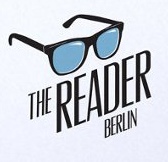 The Reader Berlin are running a programme of intensive writing workshops in Berlin this summer – immerse yourself in the Travel Writing/Memoir workshop with Kimberly Bradley and Rory Maclean (July 1st-5th), Writing Outside the Box: Exploiting your Imagination to Create Fiction with Clare Wigfall and Tod Wodicka (July 15th-19th) and the Screenwriting Lab: 2013 with Donna Sharpe and CJ HopkinsAugust 12th-16th. More details here.
The Reader Berlin are running a programme of intensive writing workshops in Berlin this summer – immerse yourself in the Travel Writing/Memoir workshop with Kimberly Bradley and Rory Maclean (July 1st-5th), Writing Outside the Box: Exploiting your Imagination to Create Fiction with Clare Wigfall and Tod Wodicka (July 15th-19th) and the Screenwriting Lab: 2013 with Donna Sharpe and CJ HopkinsAugust 12th-16th. More details here.
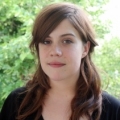
About Nerys Hudson
Nerys Hudson is a former bookseller turned literary advisor at Dialogue Books, a publishing and arts communication agency based in Berlin and online at www.dialoguebooks.org.





This is a timely article for me to read! I am a poet as well as a freelance writer/editor, and I will be moving to Berlin in July. I had the chance to discover Do You Read Me? and SAND Journal a couple of years ago when I was on vacation in Berlin, but I look forward to the opportunity to visit many of the other places you mention here.
–Bernadette Geyer